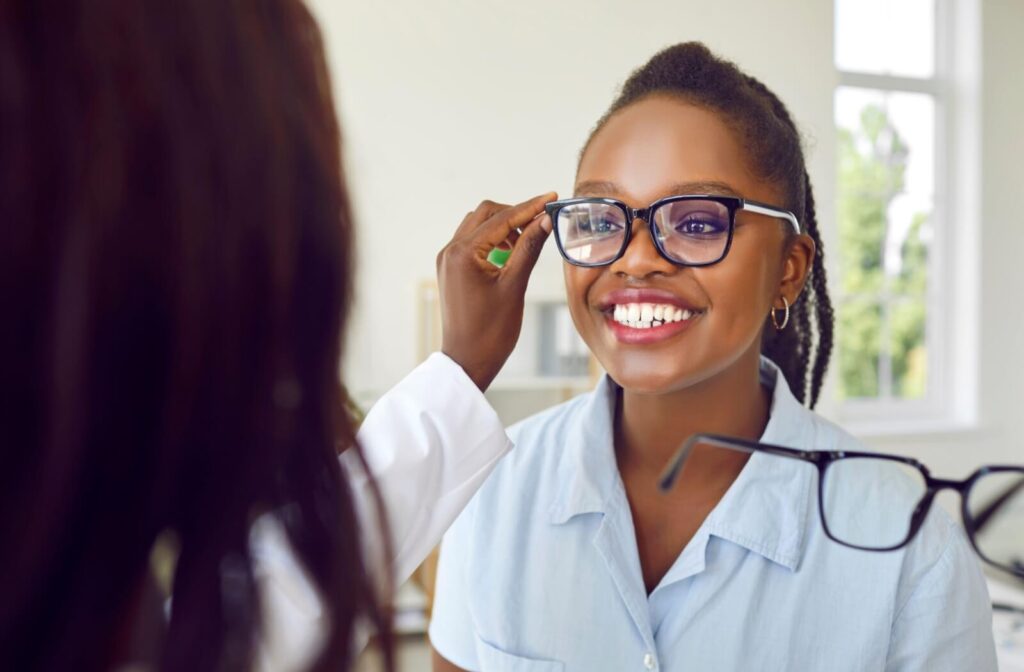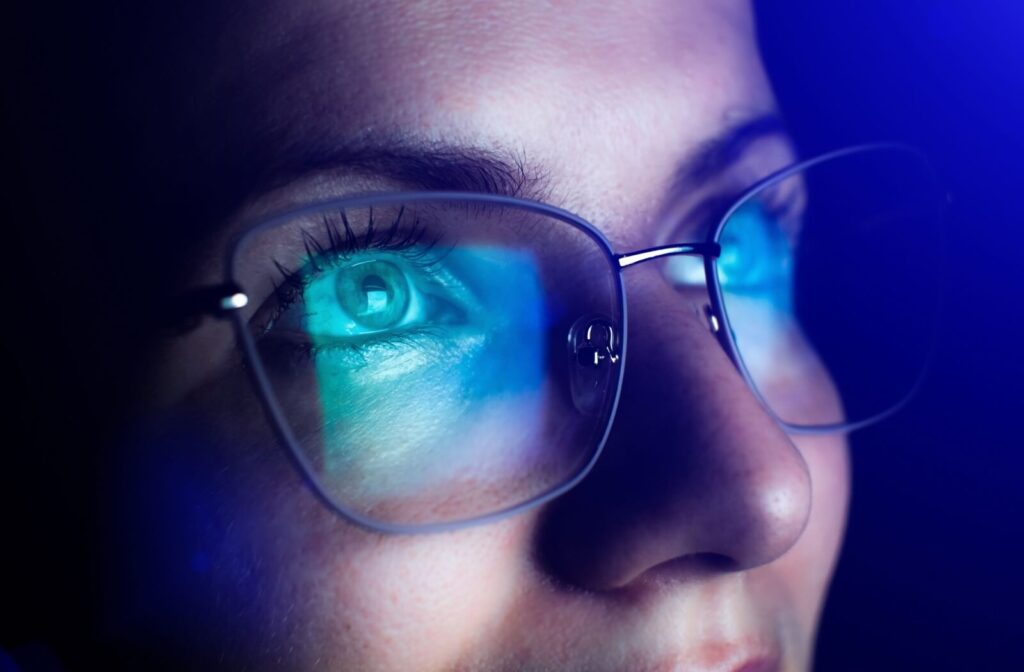Blue light is everywhere—not only is it emitted by the sun, but it’s also part of LED lighting and present in the screens that we look at every day. With the recent surge in blue light exposure caused by increasing screen time, blue light has become a buzzword in eye care. But what’s true, and what’s just hype? Can blue light from screens really damage your eyes, or are we being overly cautious?
Blue light exposure before bed may affect your sleep patterns, but it doesn’t cause serious eye disease and it hasn’t been shown to directly cause eye strain. Let’s unpack the myths and truths so you can make the right decisions for your eyes—and your eyeglasses.
What Is Blue Light?
Blue light falls within the visible light spectrum between 400 and 495 nanometres. It has a short wavelength and relatively high energy compared to other visible light. Natural sunlight is our main source of blue light, but artificial sources like screens, fluorescent lights, and LEDs also contribute to our daily exposure—especially after dark.
Exposure to natural blue light during the day helps regulate your circadian rhythm and boosts alertness and mood.
With all of the benefits, the concern isn’t blue light itself, but when and how much we’re exposed to it.
Myth #1: Blue Light Causes Eye Disease
Fact: No conclusive research shows that blue light from digital screens directly causes eye diseases like age-related macular degeneration.
What we do know is that high-intensity blue light, such as from staring at the sun or industrial-level exposure, can damage retinal cells. But the blue light from your devices is nowhere near strong enough to cause damage.
Current evidence doesn’t show a link between blue light exposure and eye disease. Nonetheless, some eye care professionals suggest playing it safe with protection—especially if you spend hours each day on a computer or phone.
Myth #2: Blue Light Glasses Prevent All Eye Strain
Fact: Blue light glasses can help, but they aren’t a cure-all.
Digital Eye Strain, sometimes called Computer Vision Syndrome, is caused by how we interact with our devices rather than by blue light itself. Staring at screens causes us to blink less frequently, while poor lighting, improper viewing distance, and bad posture are all also contributing factors.
To reduce digital eye strain, it’s more effective to combine blue light lenses with other, more practical strategies:
- Following the 20-20-20 rule (every 20 minutes, look 20 feet away for 20 seconds)
- Adjusting screen brightness and font size
- Using proper posture and screen distance/placement
Myth #3: You Should Avoid Blue Light at All Costs
Fact: Blue light is not the enemy—at least not during daylight hours.
Blue light exposure from natural sunlight helps regulate your biological clock, improve mood, and support memory and cognitive function. The problem arises during the evening, when exposure to blue light can disrupt melatonin production and interfere with our sleep cycle.
To reduce disruption, experts recommend limiting screen time at least an hour before bed. If you must use your phone or tablet, switching to night mode or wearing blue light filtering glasses may help minimize sleep interference.
How Blue Light Affects Sleep
One of the most studied and validated concerns about blue light is its impact on sleep. Blue light suppresses melatonin, the hormone that signals your body to wind down for rest. Using screens late at night can delay sleep onset, reduce REM sleep, and leave you feeling groggy the next day.
Blue light glasses worn in the evening may help maintain your natural sleep rhythm, especially for people who work late, scroll social media before bed, or use tablets to read. They’re not magic, but they can be a helpful tool in your sleep hygiene toolbox.
Choosing the Right Blue Light Protection
Not all blue light lenses are created equal. Some have coatings that filter a small percentage of blue light and reduce glare, while others are designed for nighttime use.
Here’s what to look for:
- Quality lenses: Choose lenses from a trusted optical provider that explains how much blue light is filtered and includes an anti-reflective coating.
- Your lifestyle: Are you staring at spreadsheets all day or casually watching TV in the evening? The best lenses will depend on when and how you’re using your screens.
- Added benefits: Blue light lenses often come with glare reduction and anti-smudge coatings for even more comfort.
While not everyone needs blue light glasses, those who experience poor sleep, or work late into the night may find them beneficial.
Practical Tips to Protect Your Eyes
Whether or not you wear blue light glasses, you can take simple steps to protect your vision and avoid discomfort:
- Follow the 20-20-20 rule
- Blink often while using screens
- Use night mode on devices
- Avoid screen use before bed
- Stay hydrated and keep room humidity balanced
- Book regular eye exams to monitor eye health and screen-related issues

When to See Your Optometrist
If you’re experiencing frequent headaches, dry eyes, blurry vision, or difficulty sleeping, it could be time for an eye exam.
At ISight Optometry in Kelowna, BC, we help patients navigate their screen-heavy lives with care and clarity. If you’re curious about blue light lenses, or you’re struggling with digital eye strain, our team is here to guide you through your options. Book an appointment today to find the right fit for your eyes and lifestyle.





